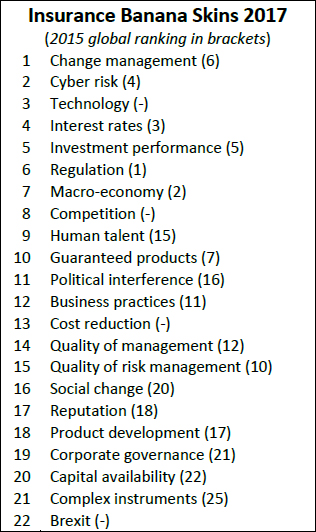Cyber Risk, Regulation & Political Interference
The global insurance industry’s ability to confront structural and technological changes is now the greatest risk it faces, according to a new survey of insurers and close observers of the industry.
The CSFI’s latest Insurance Banana Skins 2017 survey, conducted with support from PwC, surveyed 836 insurance practitioners and industry observers in 52 countries, including 49 in Bermuda, to find out where they saw the greatest risks over the next two to three years.
The response in the Bermuda survey was dominated by concern over external forces threatening the market. Cyber risk was the top concern in the Bermuda market, followed by regulation and political interference.
Bermuda insurers and reinsurers expressed strong concerns about the threat of political interference in the form of efforts by President Trump to prevent the export of US insurance business to offshore centres.
And Bermuda was one of the few jurisdictions which expressed concern about Brexit because of its connection with the London market and passporting from there into the EU.
Notable was the very low level of concern about the prospect for interest rate movements: an upward movement would be welcomed.
Arthur Wightman, PwC Insurance Leader, said: “The societal and economic contributions from insurance continue to be the stabilising force in the global capital markets.
“That said, the complexity of running global insurance companies continues to grow amid increasing wealth disparity, blurring of industry boundaries, age demographic pressures, the breakdown of global consensus, and increasing nationalism and declining trust.
“There are huge opportunities for the market, but CEOs have a very challenging task with succeeding amongst this change.”
Mark Train, PwC Global Insurance Risk Leader, comments: “Both the challenges and opportunities presented by change underline the vital importance of being clear about where you’re best able to add value, and then being ruthless in targeting investment and management time at these priorities.”
Bermuda produced a lower than average score on the Banana Skins Index, implying a lower level of risk anxiety. It produced an above average score on the Preparedness Index, implying a higher level of preparedness.
David Lascelles, survey editor, said: “For the first time in six editions of this survey, operating risks pose the greatest threat to insurers. Structural and technological changes to the industry could upend traditional business models. At the same time, insurers are grappling with a very difficult economic climate, which helps explain why anxiety is at an all-time high.”
Global Report
Globally, change management tops a cluster of operating risks which have jumped to the top of the rankings. In Bermuda it came in at number six.
The report raises concerns about the industry’s ability to address the formidable agenda of digitisation, new competition, consolidation and cost reduction it faces, especially because of rapidly emerging technologies which could transform insurance markets, such as driverless cars, the ‘internet of things’ and artificial intelligence.
Cyber risk follows close behind, with anxiety rising about attacks on insurers themselves as well as the costs of underwriting cyber-crime. Other major concerns include the adequacy of insurer’s internal technology systems and new competition from the InsurTech sector.
The next cluster of high-ranking risks, interest rates, investment performance and macro-economic risk, shows that concern about economic instability remains high. Although respondents acknowledged signs of growth, confidence in the recovery is not strong for reasons as widely dispersed as the slowdown in China, the risk of Trump-era protectionism, and populism in Europe.
The risk of political interference was seen to have risen sharply. However, Britain’s exit from the EU was seen to be a minimal source of risk for insurers, particularly those without operations in the UK.
Regulatory risk, which has topped the last three editions of this survey, has fallen out of the top five this year. This is largely because recent regulatory changes are settling in to business as usual [e.g. Solvency 2], though the cost and complication of regulation continue to be a concern.
The report shows that the industry’s ability to attract and retain human talent is a fast-rising concern, particularly to handle the digital challenge. Conversely, an area of declining risk is the governance and management of insurance companies. These were seen as high-level risks during the financial crisis but have fallen sharply since, because of both initiatives from the industry itself and regulatory pressure.
Overall, the climate for insurers is becoming more challenging, according to respondents. The 2017 Banana Skins Index, which measures the level of anxiety in the industry, is at a record high, while the industry’s preparedness to handle these risks has fallen from 2015.
The full CSFI/PwC Insurance Banana Skins 2017 report is below [PDF here]



